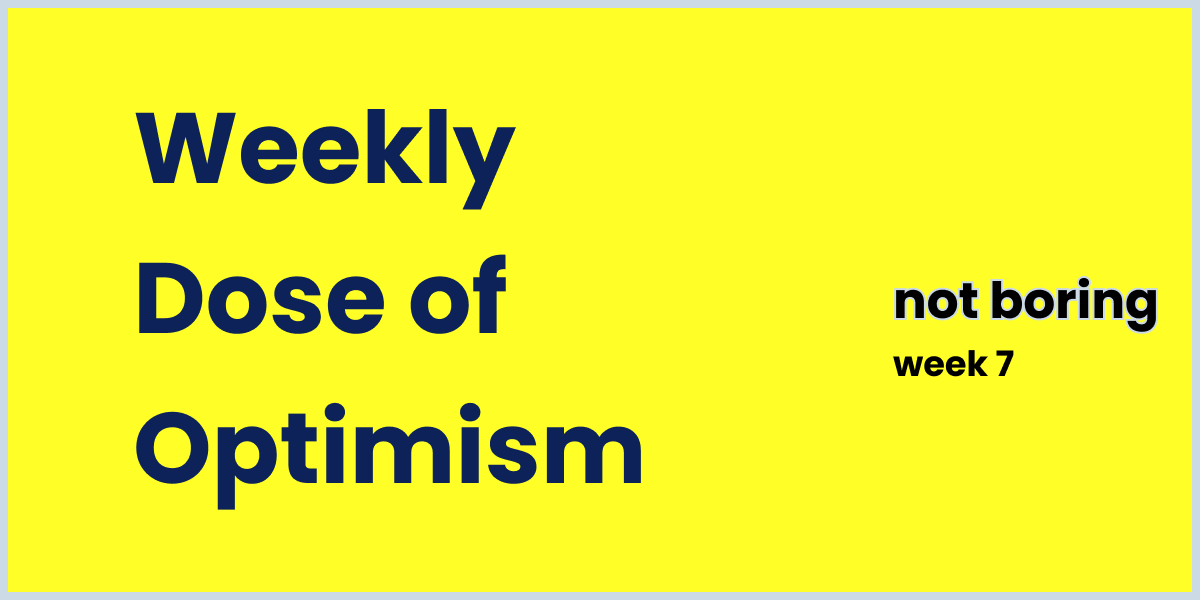Weekly Dose of Optimism #7
Moderna, Reddit Herpes, Carbon Capture, Serena, and Technological Stagnation?
Come for the Optimism, stay for the in-depth analyses of tech companies and trends:
Hi friends 👋,
Happy Friday! Welcome to our 7th Weekly Dose of Optimism, where we celebrate the incredible accomplishments humans manage to pull off and the progress that we’re making. We’re never perfect, but I think we’re moving in the right direction.
If you’re enjoying this Weekly Dose, spread the optimism by forwarding this email or sharing the newsletter wherever you share good things.
The Weekly Dose is brought to you by my daily dose… Athletic Greens
Every morning, I drink a homemade concoction starring Athletic Greens’ AG1. It’s one of the few products I actually use daily.
An AG1 subscription isn’t cheap — it’s ~$79/month or almost $1,000 year. But if being at the top of your game is as important to you as it is to me, it’s worth it.
Get a free one-year supply of Vitamin D and 5 travel packs when you order with the special Not Boring link.
(1) Moderna's Bets: Moonshots and Platforms
Byrne Hobart for The Diff
The fun way to look at Moderna in 2022 is that it's a wildly exaggerated version of Moderna circa 2019: lots of promising products in the pipeline, lots of cash with which to pursue them, and a credible claim that each new drug they launch makes the next ones faster and cheaper to develop.
Byrne is every newsletter writer’s favorite newsletter writer. This week he breaks down one of the most important companies of the last few years, Moderna, and explains how its “breakthrough” on the Covid vaccine wasn’t just a one-off blockbuster success, but rather an instructive case-study on the company’s overall strategy. Here’s the upshot: mRNA vaccine & therapeutic early-stage development (as pioneered by Moderna) can be orders of magnitude quicker and cheaper than traditional methodologies. This allows Moderna to pursue many different research avenues at once, and once they identify a winner, out-scale more focused, specific developers during the costly periods of late-stage drug development.
(2) The Reddit Group Helping to Fund Herpes Vaccine Research
Mark Hay for Inside Hook
To date, the group has raised over $350,000 to support Friedman’s vaccine research. This sum is nowhere near the cash infusion of a big grant, or industry backing, he acknowledges. But it has allowed him to fill gaps, investing in resources his existing budget would cover, which will help him speed up and strengthen his work — like hiring two new full-time staff to work on the study.
Not every vaccine research project has the resources of Moderna’s $8B balance sheet behind it. When Harvey Friedman’s, a leading herpes researcher, traditional funding for his promising genital herpes vaccine came up short, he got support from an unlikely source: r/HerpesCureResearch. Friedman’s vaccine showed promising results during animal testing, but was not getting the necessary funding it needed to enter into early stage human trials. The Reddit community stepped up and crowdsourced $350,000 to fill in the funding gaps. A similar concept is being scaled by Not Boring Capital portfolio company, Vibe Bio, which is a community of patients, scientists, and partners committed to funding and treating rare diseases. Genital herpes is by no means rare — the CDC estimates 12% of the US population between 14 and 49 have the condition — but funding for the cure does suffer from the same lack of pharma business model alignment that rare diseases do.
(3) 🎧 Carbon Removal Might Be the Most Important Technology. How Does It Work? 🎧
Derek Thompson for The Ringer
I’ve become very interested in a technology called carbon removal—and especially direct air capture. Imagine, basically, a giant factory that pulls carbon from the atmosphere and buries it. This technology is still incredibly expensive. In August 2022, it is not remotely close to being a global solution to climate change. But there is a chance it may be the most important technology of the 2020s and 2030s.

In January, Derek Thompson, of “Plain English” & The Atlantic, proposed the Abundance Agenda — the view that the US needs to increase its supply of national essentials: houses, physicians, medical tests, immigrants, solar panels, et al. At its core, this policy is meant to make America less vulnerable to things like pandemics, labor shortages, and climate change. The Abundance Agenda advocates for more (and cleaner) sources of energy, but if is embraced full-throttle, it likely means the US will become a larger emitter of carbon dioxide. In this episode of Plain English, Giana Amador, joins Derek to discuss one path to reducing our carbon footprint while still pursuing the Abundance Agenda — carbon capture.
(4) Serena Williams Says Farewell to Tennis On Her Own Terms—And In Her Own Words
Serena Williams for Vogue
I’ve built a career on channeling anger and negativity and turning it into something good. My sister Venus once said that when someone out there says you can’t do something, it is because they can’t do it. But I did do it. And so can you.
Not Boring isn’t a sports blog. Neither is Vogue. But we both recognize greatness. It’s pretty incredible to see humans perform at the absolute peak. And for the last 20+ years, Serena Williams has been at the top of the tennis world: 23 Grand Slam singles titles, an 85% win rate, and 319 weeks ranked #1 in the world. Tennis has been basically her whole life for as long as she remembers, but she makes it clear: she is not happy about “retiring.” She doesn’t want to do it. It’s amazing how manically focused ultra-high performers are — even after ~35 years of all-encompassing tennis, Serena needs to be dragged off the court.
While we typically talk about technological progress in the Weekly Dose, it’s pretty incredible how far human performance has progressed in just the last century. For video proof, check out this tweet showing how gymnastics changed between 1912 and 2012.
(5) Has Technological Progress Stalled?
Tanner Greer for The Scholar’s Stage. Submitted by @archimboldii
A future boom will not come from improvements in organization and information. It will be from inventing new materials to build from, new ways to move what we build, or new sources of energy to power our building. This is my yardstick for evaluating the “revolutionary” potential of new technologies.
Essayist Tanner Greer responds to Mary Harrington’s long-form interview of Peter Thiel, in which Thiel explains his belief that technological progress stopped in the early 1970’s. Greer, aligning more closely with Professor Vaclav Smil than Thiel, argues that the US has been experiencing stagnation since the pre-Word War I period. True periods of technological progress don’t come from improvements in organization or information transmission, Greer asserts, but rather from physical transformation of the world around us. “It means mud to concrete. Wood to steel. Sweat to dynamos. Shovels to dynamite. Wicks to lightbulbs. Carts to cars to aeroplanes.” On one hand, Greer’s view of progress is pessimistic — claiming that we have not achieved many foundational breakthroughs in the last ~100+ years. On the other, it’s optimistic: quality of life has undoubtedly improved in the last 100+ years, and that improvement has come without any major periods of progress (in Greer’s view.)
There’s something appealing about the view that Greer borrows from Smil — essentially, that progress should be measured in joules — and while I’m not sure I agree with the whole essay, I’m in strong favor of a world with more, cheaper joules.
Housekeeping
Not Boring Talent Collective — check it out here.
Thanks again to Athletic Greens for sponsoring The Weekly Dose of Optimism.
Thanks to Dan for taking charge of the Weekly Dose while I’m on paternity leave!
Humans are pulling off some pretty incredible things every week. Whenever you find examples, share them here and we’ll feature some in the newsletter.
Have a great weekend, and see you on Monday for a look into what humans are pulling off beyond Earth’s atmosphere 👀 🚀
Packy







Why are you simping for Moderna? It never successfully brought a product to market until the COVID EUA, which skipped important safeguards. The "secret" to Moderna and Pfizer's record profits is an unprecedented business model where they lobby governments to mandate subscription to their products, but they can't be sued for adverse effects. European countries whose regulatory bodies are not as captured as the US FDA/CDC have banned COVID jabs for healthy young people. Here's a solid subscription business to look at: https://yuribezmenov.substack.com/p/how-to-build-a-killer-business-and
Thoroughly enjoyed!.
I also wrote an eclectic piece (US 5Y5Y real-rates, the labour market, Louboutin heels) in my latest monthly editorial:
https://hxllywxxdvices.substack.com/p/hxllywxxdvices?utm_campaign=post&utm_source=direct